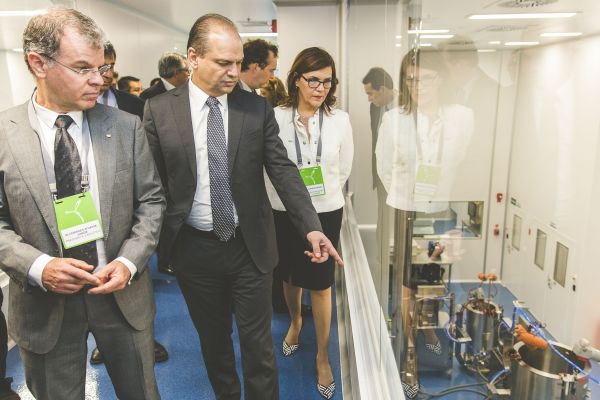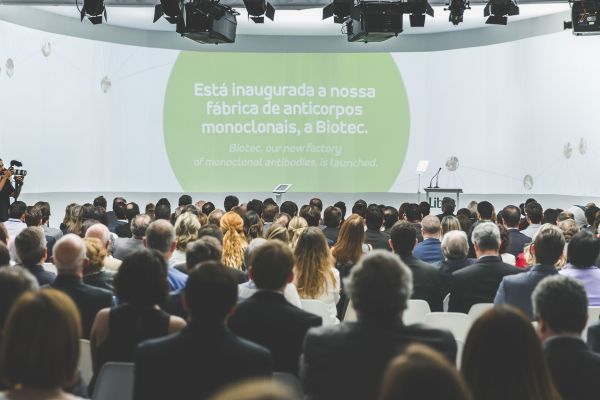Libbs opens first plant of monoclonal antibodies on industrial scale in Brazil
With an investment estimated at R$ 500 million, which relied on the support from Investe SP, Biotec will expand the access of biopharmaceuticals to the population affected by cancer and autoimmune diseases
Investe São PauloOn November 25, Libbs, a national pharmaceutical industry, opened its Biotec plant for the production and development of biological drugs based on monoclonal antibodies on industrial scale, which will contribute to the treatment of cancer and autoimmune diseases.
The project includes an investment of up to R$ 500 million. For the construction of the plant, located in Embu das Artes, the company has already invested R$ 227 million of a total of R$ 250 million. This amount was funded by the National Bank for Economic and Social Development (BNDES). To conduct clinical studies, the investment should reach the R$250 million, funded by the Financier of Studies and Projects (FINEP), associated with the Ministry of Science, Technology, Innovation and Communications (MCTIC).
Investe São Paulo, the investment promotion agency associated with the Department of Economic Development, Science, Technology and Innovation of the state of São Paulo had an essential role in the project. “We have been working with Libbs for a year, and we provide support to all projects promoted by the company in the state of São Paulo. The health sector has always been one of our priorities, due to all the technology and value added it brings to the economy”, said the president of Investe SP, Juan Quirós.
“Incorporating the technology to produce these drugs in our country is of fundamental importance because, according to the Ministry of Health, biological drugs currently consume 43% of its funds, approximately R$ 4 billion per year, although they represent only 5% of the amount of drugs acquired. “This tends to increase due to the increased life expectancy of the population and therapeutic advances increasingly focused on biological drugs”, said the director of Institutional Relations at Libbs, Marcia Bueno.
Biotec will have a total capacity to produce over 400 kg of biopharmaceuticals per year. The first six drugs to be produced by the plant are rituximab, trastuzumab, bevacizumab, palivizumab, adalimumab and etanercept. All focused on Productive Development Partnerships (PDP), a program to encourage the domestic production of drugs and medicines of the Ministry of Health, which includes the transfer of knowledge to public laboratories – which, in the case of Libbs, will be Butantan Research Institute.
According to the CEO of Libbs, Alcebíades Athayde Júnior, this project was idealized a long time ago and gradually took shape, with planning, organization and involvement of everyone in the team. “After a hard work, we are ready to produce biological drugs here in Brazil and we will contribute to make them more accessible in order to reduce the current technological dependence and vulnerability in relation to the international market”, said the CEO.
The plant will feature an innovative technology in its production system: the single-use. In this case, the bioreactors, where the monoclonal antibodies are produced, receive disposable bags which feature as their main advantage, the flexibility and optimization of the process, since they do not require complex operations of decontamination and sterilization of equipment. “We promoted saving of 80% of water and 90% of cleaning products, since, after use, the bags are sterilized and incinerated. For the patients, the process ensures quality, avoiding the risk of cross contamination in the production stages”, said Marco Dacal, Director of the B2B area.
Libbs and its partnerships
Libbs partnered with mAbxience, a company of Chemo group, for the transfer of technology of the biopharmaceuticals that it will produce for the treatment of cancer and autoimmune diseases. The first two that are in more advanced stages of clinical development are rituximab and bevacizumab. But before they reach the market, rituximab, produced by Libbs, already made history: it was the target of the first clinical study of a biosimilar monoclonal antibody conducted by a Brazilian company.
The company also entered into a partnership for a project of the University of Utrecht in the Netherlands. The project is focused on the development of palivizumab biosimilar, a monoclonal antibody indicated to prevent infection by respiratory syncytial virus in premature babies. The project will be coordinated by the University of Utrecht, with the support from the World Health Organization (WHO) and will be developed by the companies mAbxience, Medigen – pharmaceutical industry of Taiwan – and by Spimaco, pharmaceutical company of Saudi Arabia.








